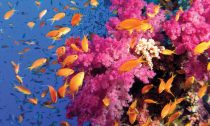
Around the world, oceans are providers: of food, of livelihoods, of entire economies.
But, where do people depend on them the most? Knowing this could help to better protect marine ecosystems.
A new study, published in Conservation Letters, found that many Pacific and Indian island nations are the most dependent on marine ecosystems for their nutrition, jobs, revenues and coastal protection. Globally, 775 million people — 10 percent of the world’s population — live in areas with relatively high dependence on marine ecosystems.
Human Nature spoke with two authors of the study — Liz Selig, deputy director of the Stanford Center for Ocean Solutions, and David Hole, vice president for global solutions for Conservation International — about their results and why they matter for conservation.
Question: What was this study about?
Selig: The aim of this study was to try to understand where people are most dependent on marine resources and in what ways people depend on these resources. This is crucial for ensuring that we have healthy oceans and that the people who rely on them are able to get the benefits they need. We mapped human dependence on marine ecosystems for benefits such as nutrition, jobs, revenues and coastal protection. The long-term goal of our work was to help ensure that management strategies are designed to deliver those benefits. For example, if you have populations that rely on fisheries for employment, then management and policies might be designed to support access to small-scale fisheries. On the other hand, if people depend on fisheries for revenues, a focus on managing fisheries for profitability and economic efficiency may be needed. In all cases, delivering those benefits relies on healthy, sustainable fisheries and intact marine ecosystems.
Hole: We are trying to make the link between nature and people explicit. With this study, we looked at these relationships on a global scale to provide insight into the “big picture” — just how many people are dependent upon the oceans for their lives and livelihoods — to help us better target and implement conservation strategies.
Q: Liz, what’s interesting about that, especially compared with past research?
Selig: Our study is unique in that we are able to see where people depend on marine ecosystems for different reasons. We found several interesting patterns. For example, several countries in West Africa are particularly dependent on marine ecosystems for their nutrition, and at the same time, several of the wealthiest countries in the world — Norway, Iceland and Japan — are also relatively dependent on marine ecosystems for nutrition, largely because of cultural preferences that drive consumption patterns.
Our work also highlights the importance of the oceans in global food systems. Nearly 525 million people were found to be highly dependent on marine ecosystems for nutrition, illustrating the importance of marine fisheries to food security.
Q: Dave, how does climate change come in to play in this study?
Hole: It’s crucial. We looked at the influence of climate change in the coastal protection aspect of the study because the likelihood is that if an area is currently getting hit by storms, it’s just going to get worse in the future — those places will either be hit harder or more often. So, essentially our map is a map of where coastal ecosystems — mangroves and coral reefs — are going to be even more essential in the future. While we didn’t explicitly include climate change’s role in the other dimensions, we recognize that it’s a crucial factor that will influence all aspects of people’s dependence on the oceans. Fisheries, for example, are already shifting their distributions in response to increasing ocean temperatures, and so the potential disruptions in people’s livelihoods and food security is very real and immediate.
Q: What does this mean for future research, policy and marine ecosystem management?
Selig: This research looks at the human side — understanding where populations rely on marine ecosystems. The next thing to understand is where the ecosystems are that are providing these benefits. In some cases that might be simple — for example, if a population depends on marine ecosystems for coastal protection, then nearby coral reefs or mangroves would be the focus for management. With nutrition and economic benefits that come from fisheries, tracking back is harder because of the inherent mobility of fisheries and trade. Understanding some of those linkages will help ensure that we are laying the groundwork for more effective large-scale management and policy.
Hole: From Conservation International’s perspective, it’s important to understand the myriad different ways in which people depend upon nature and where and for whom those linkages are most important. The oceans hold so many different values for people, but being able to point to those regions that are vitally important for people’s lives and livelihoods, such as mangroves and fisheries, can help enable more sustainable use of these resources. Looking at the countries with the highest marine dependence, they overlap with many of Conservation International’s seascapes, where we target much of our marine conservation work — which helps us be even more confident that we’re working, along with our partners and local communities, to conserve some of the most important places on Earth.
Liz Selig is deputy director of the Stanford Center for Ocean Solutions. David Hole is vice president for global solutions for Conservation International. Olivia DeSmit is a staff writer for Conservation International.











Social Profiles